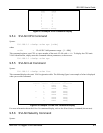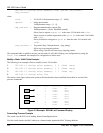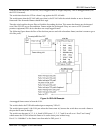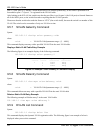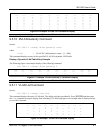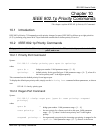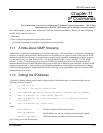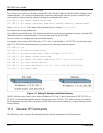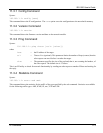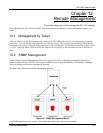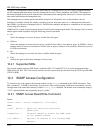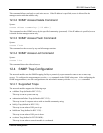
IES-1000 User’s Guide
IP Commands 11-1
Chapter 11
IP Commands
This chapter shows you how to configure the IP (Internet Protocol) parameters. The IP host
implementation in the IES-1000 allows you to manage it over the network.
More often than not, you have more than one IES-1000 for a particular installation. Before you start configuring
the IES-1000s, make sure that you
1. Plan ahead.
2. Have a complete diagram showing the whole network.
1. Record the IP parameters assigned to the equipment in your network.
11.1 A Note about IGMP Snooping
Traditionally, IP packets are transmitted in one of either two ways - Unicast (1sender to 1 recipient) or Broadcast (1
sender to everybody on the network). Multicast delivers IP packets to just a group of hosts on the network. IGMP
(Internet Group Multicast Protocol) is a session-layer protocol used to establish membership in a Multicast group -
it is not used to carry user data. Refer to RFC 2236 for information IGMP version 2 and RFC 1112 for IGMP
version 1. A Layer 2 switch can passively snoop on IGMP Query and Report packets transferred between IP
Multicast Routers/Switches and IP Multicast host groups to learn the IP Multicast group members. It checks IGMP
packets passing through it, picks out the group registration information, and configures multicasting accordingly.
IGMP Snooping generates no additional network traffic, allowing you to significantly reduce the multicast traffic
passing through your switch.
11.2 Setting the IP Address
To set the IP address, default gateway and the subnet mask of the Ethernet port of a network module, use the
following command sequence.
1.
192.168.1.1> ip
2.
192.168.1.1 ip> device delete ether
3.
<mac address> ip> device add ether ether //bridge <new ip address>
4.
<new ip address> ip> route delete default
5.
<new ip address> ip> route add default 0.0.0.0 <default gateway>
00:00:00:00
6.
<new ip address> ip> config save
where
<mac address> =
The MAC address of the network module.
<new ip address> =
The IP address you want to configure into the network module.
<default gateway> =
The default gateway IP address of the network module.
Line 1 brings you to the IP subsystem.



